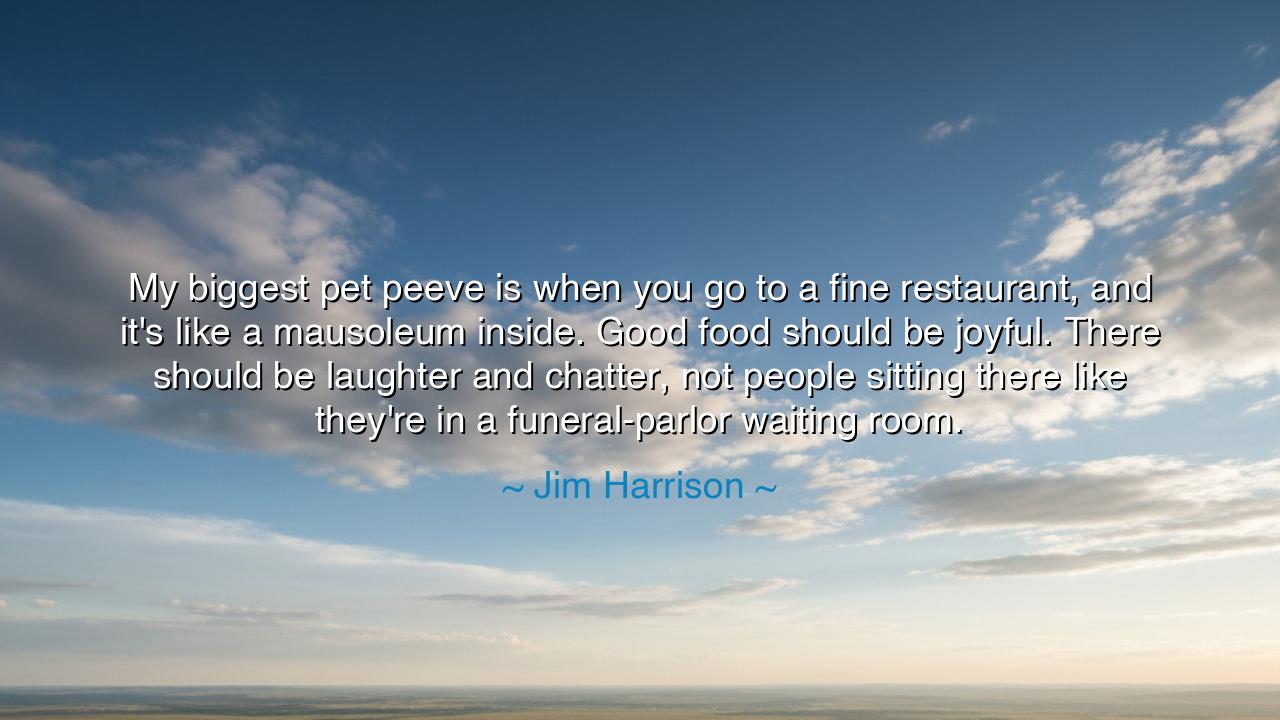
My biggest pet peeve is when you go to a fine restaurant, and
My biggest pet peeve is when you go to a fine restaurant, and it's like a mausoleum inside. Good food should be joyful. There should be laughter and chatter, not people sitting there like they're in a funeral-parlor waiting room.






Jim Harrison once spoke with both humor and fire: “My biggest pet peeve is when you go to a fine restaurant, and it’s like a mausoleum inside. Good food should be joyful. There should be laughter and chatter, not people sitting there like they’re in a funeral-parlor waiting room.” In this, we hear not merely the complaint of a man against silence, but the cry of the soul against the killing of life’s spirit. For to eat is not simply to feed the body—it is to commune with one another, to partake in the ancient ritual of fellowship that has bound tribes and empires together since the dawn of time.
The mausoleum he names is a symbol, cold and lifeless. To sit at a table in silence, to treat a feast as if it were a solemn rite of mourning, is to deny the very essence of food. Food is born of earth, sun, rain, and labor; it is meant to bring warmth, not chill. Harrison reminds us that a table without joy, without laughter, is no better than a tomb, where the living masquerade as the dead. The act of eating must not be reduced to performance or decorum—it must be celebration, flame, and communion.
The ancients themselves knew this truth. In the halls of Athens, banquets were not hushed affairs but symposia, gatherings where philosophy was poured alongside wine, and ideas mingled with song. The Norse spoke of Valhalla, where fallen warriors feasted forever, their cups always brimming, their halls echoing with chatter and song. Even the humble hearth-fire of the peasant family was sacred, for it was where bread was broken, stories told, and laughter shared. All cultures, in their wisdom, knew this: that food without fellowship is emptiness, and a meal without voices is but ashes in the mouth.
Consider also the story of Jesus among his disciples. His miracles were not performed in silence, but often around tables—at weddings, at suppers, at gatherings of friends and strangers. The Last Supper itself, though shadowed by betrayal, was an act of fellowship, a breaking of bread together before parting. The presence of shared meals in sacred texts across civilizations proves the truth Harrison speaks: that the restaurant, like the ancient feast, should be filled with life, with voices, with the sound of souls alive in the present.
What Harrison rails against is not merely silence, but pretense. There is a kind of false reverence that worships etiquette over essence. People sit stiffly in fine clothes, speaking in whispers, as though reverence for the chef demands the burial of their own spirit. Yet the truest reverence for good food is to celebrate it. To smile, to laugh, to let conversation and warmth flow freely—that is how one honors the labor of the farmer, the hands of the cook, and the gift of the harvest itself.
The lesson is as radiant as firelight: when you sit at table, be alive. Do not fear your voice, nor hide your joy. Let laughter ring like a bell, let chatter weave between courses like music. The table is not a stage for performance but a hearth for human connection. Do not be ashamed to take delight in the flavors before you; it is not gluttony to rejoice in good things, it is gratitude. Gratitude demands not silence, but expression.
Practical action is clear: when you next gather with others, treat the table as sacred space. Put away the distractions that steal your attention. Share stories, raise toasts, let children speak loudly without shame. If you find yourself in a restaurant that feels like a tomb, break the silence—speak, laugh, remind others that life belongs to the living. Invite those around you not only to eat but to feast, not only to consume but to celebrate.
Thus Harrison’s words are no small complaint, but a teaching for the ages: Do not let your meals become mausoleums. Make them instead into festivals of joy. For in the end, when our days are counted, it is not the silence we shall remember, but the sound of shared laughter over bread and wine, the eternal song of fellowship that turns mere food into the sacrament of life.






AAdministratorAdministrator
Welcome, honored guests. Please leave a comment, we will respond soon